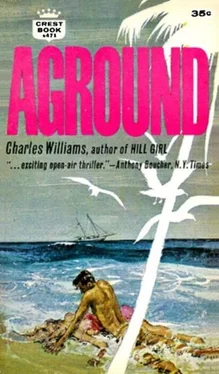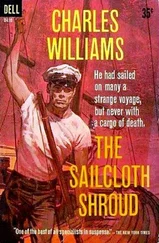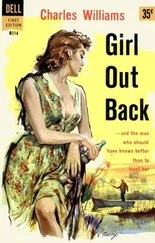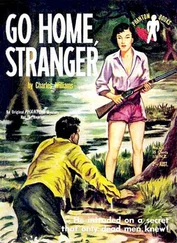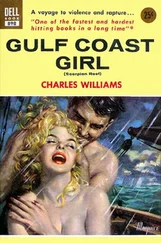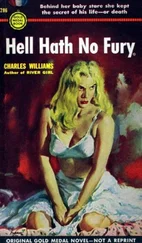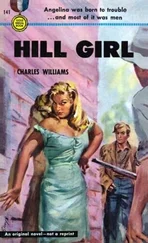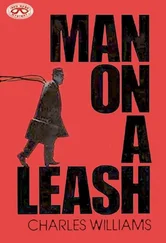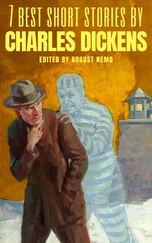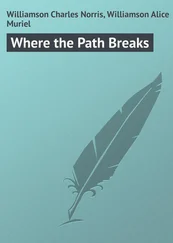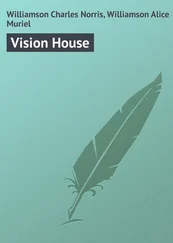“Maybe Herman’d like a drink,” Morrison said. Rae Osborne shrugged. “Herman’s not stapled to the deck. Let him go get one.”
Morrison lighted a cigarette and spoke to Ruiz. “We better figure out what we’re going to do with ‘em tonight, unless we want to take turns standing watch. Tie ‘em up, or lock ‘em in one of those staterooms?”
“It’s pretty stuffy down there till after midnight,” Ruiz said. “Why not put them on the island? They can’t get off as long as we’ve got the raft.”
“Sure, that’d do it. Lieutenant, you’re now a captain.” Rae Osborne rattled the ice in her glass and said sulkily, “You mean I’ve got to go over on that crummy sand bar and sleep on the ground like Daniel Boone? I want another drink first.” “Sure, Baby Doll. Have all you want.” “Besides, what could I do to that hunk of brute force, anyway? You afraid I might overpower you, or something?”
Morrison grinned. “On second thought, maybe we’ll reconsider the first thought. Our yacht is your yacht. Drink up.”
“Open another bottle, Commodore, and alert the riot squad. Can you get any mambo music on that radio?”
Ruiz stood up and spoke to Ingram. “You ready to go?”
“Yes,” Ingram said. He looked at Rae Osborne. “You’re sure you want to stay?”
She considered this thoughtfully. “If I have your permission, Herman. Tell you what—you go check the action on that sand bar, and if it’s real frantic, drop me a line.”
Morrison spread his hands. “Looks like you lose, Herman.”
“I guess so,” Ingram said. “Anyway, it’s one interpretation.”
Rae Osborne smiled. “Don’t mind Captain Ingram. He’s full of deep remarks like that. He’s a philosopher. With corners, that is.”
Ingram nodded curtly to Ruiz. “Let’s go.”
He took the oars while Ruiz sat in the stern holding the Colt. It was dusk now, and the flow of the tide was decreasing as it approached high slack. The sand spit was a low, dark shadow marked by the pale gleam of the boxes where Morrison had stacked them near the southern end. Neither of them said anything until the raft grounded in the shallows beyond the channel. Ingram got out. Ruiz moved over and took the oars. “Buenas noches.”
“Buenas noches,” Ingram said. The raft moved away in the thickening twilight, and he waded ashore to stand for a moment beside the piled boxes, savoring the unbroken quiet and the clean salt smell of solitude and night. Then some faint remnant of deep-water surge flattened by miles of shoals and bars curled forward and died with a gentle slap against the sand, and somewhere beyond him in the darkness a cruising barracuda slashed at bait. Everybody, he supposed, had something he hated above all else to leave, and this was his: the tropic sea. In a dozen lifetimes he’d never have grown tired of it.
The bottle of water was near his feet. He picked it up, and judged it was still half full. He wondered how many cigars he had, wishing he’d thought to get more from his suitcase before leaving the schooner, but when he opened the case and probed with his fingers he discovered he had three. That was plenty. He lighted one and sat down on the sand with his back against the boxes.
Could he get aboard later on when they would be asleep? He could swim that far, but getting onto the schooner would be something else. They’d be too smart to leave the raft in the water so he could climb into it and reach the deck. How about the bobstay? He should be able to reach the lower end of that and work his way hand over hand up to the bowsprit. But the chances of doing it without waking either of them were admittedly dim; at any rate, he’d have to wait until after midnight.
A shriek of laughter reached his ears, and then the sound of music. They’d switched on the all-wave radio. He lay back on the sand and watched the slow wheel of the constellations while the sound of revelry came to him across the night. For a while he pictured the inevitable progress of the brawl, but gave it up with the accumulation of disgust and tried to shut it out. It was none of his business. His thoughts broke off then as he caught the sound of oars. He heard the raft scrape on sand, and stood up. The slender figure would be Ruiz. It waded ashore in the starlit darkness and pulled the raft onto the beach. He appeared to be carrying something in his arm.
“Over here,” Ingram said quietly.
“Don’t try to get behind me, amigo.”
“I’m not,” Ingram replied. He flicked on the cigar lighter. “Party get a little rough for you?”
Ruiz came into the circle of light, the fatal olive face as expressionless as ever. “I brought you some bedding,” he said, dropping a blanket and pillow on the sand. “Gets a little cool out here before morning.”
“Thanks a lot,” Ingram said. “Sit down and talk for a while. You smoke cigars?”
“I’ve got cigarettes, thanks.” He took one out and lighted it, squatting on his heels just precisely out of reach with the eternal vigilance of the professional. A shellburst of maracas and Cuban drums came to them across the water. “Están bailando,” he said with faint reluctance, as though he felt he should say something of the party but wished to make it as little as possible. Well, if they were dancing, Ingram thought, the brawl must be still on a more or less vertical plane. He wondered what difference it made.
“What kind of guy is Morrison?” he asked.
“Rugged. And very smart.”
“How long have you known him?”
“Off and on, since the war. We were in New Guinea together, and later sent in with a kind of shaggy and irregular outfit in the Philippines. On that guerrilla stuff, he could write the book.”
“That where he learned Spanish?”
“Yes, but not during the war. He was born in the Philippines; his father was in the mining business. But he has the knack—some people have it, some don’t. He also speaks Tagalog and German and a couple of very useless Central American Indian dialects. And Beatnik. Incidentally, where did you learn it?”
“Mexico, and Puerto Rico. But my accent’s not as good as his.”
“No,” Ruiz said.
“Where are you from?”
“Here and there. I went to school in the States.”
“U.S. citizen?”
“Yes. Since the war.”
He fell silent. Ingram waited. He hadn’t come out here merely to exchange biographical information. Maybe, with the Spaniard’s innate dislike for drunkenness, he was just escaping from the party, but he could have something else on his mind.
“How far are we from the coast of Cuba?” Ruiz asked then.
“Hundred miles,” Ingram said. “Maybe a little less. Why?”
“I just wondered. What would you say were the chances of making it in that raft?”
“How many people?”
“Call it one.”
“Still very dim, even with one. It’s too small.”
“That’s what I thought. But when we get started again, if we do, we pass pretty close, don’t we?”
“That’s right. The way into the Caribbean from here is through the Windward Passage between Cuba and Haiti. You’ll be within sight of Cape Maysi.”
“Maysi?”
“Punta Maisí . It’s the eastern tip of Cuba.”
“I get the picture.”
He’s going over the hill, Ingram thought. But why? They’ve got it all their way at the moment. Something nibbled at the edge of memory, and then was gone. “What’s the trouble?” he asked. He wouldn’t get the truth, but he might get one of the wrong answers he could eliminate.
“This is a sad operation,” Ruiz said. “And getting sadder. We’ll never make it.”
“There is that chance. And a very good one. But then I wouldn’t say that knife-and-run stuff in the Philippines was anything that’d make you popular with insurance companies.”
Читать дальше
